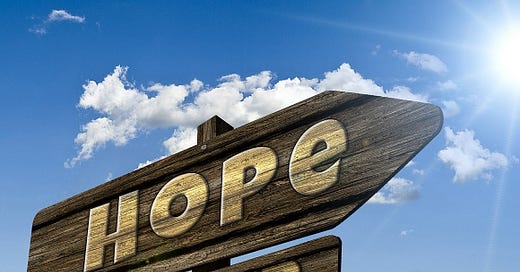The Role of Placebo and Nocebo in Symptoms and Suffering
Expectation Effects in Chronic Conditions and Trauma
This is part of a series of articles co-written with my friend, colleague, and therapist
, who is the lead author on them. Lilian is a Danish coach and trouble shooter good at seeing patterns, with a masters in biology. She has studied how to help people with chronic symptoms, from a practical perspective, for five years. These articles result from extensive conversations and Q+A’s I have had with Lilian.Lilian also now has her own substack,
- please support her by subscribing:Blame and Shame are Also Limiting Beliefs
When I start talking about expectation effects, the first thing I often hear from people is that they feel like I am blaming them for their disease, and am saying it is their own fault. I am definitely not saying this. In the same way as I would never accuse a child of being the root cause of neglect, abuse, or bullying, even later in life, no one is to blame for, say, picking the wrong partner or the wrong job that became toxic after a long time.
Certainly, as long as no one learns about any of this in school, no one is to blame.
My Way Into This - Pattern Recognition
I have for five years used my biological knowledge, and collected information about how people around the world became better from various diagnoses. A few of them had the skills to put their knowledge into web pages and in videos. They made long recipes for their journey towards better health. At first glance, I could not see any similarities, but reading more and more of those stories, the patterns emerged which were common in their journeys to recovery.
The Placebo Effect - Believing Better is to Come
If we take all the medical studies made after 1960, we will see a phenomenon called the placebo effect that relentlessly teases scientists creating new drugs worldwide. Rather than seeing this as something which gets in the way, it is better to actually see it as a superpower that is an essential factor in diseases. It is the innate power in the human body which is so significant that it can often out perform a medical substance. Indeed, a lot of potential medications are dismissed in the clinical trial phase due to the participants finding just as much relief and healing from a sugar pill given to them in the study, instead of the medical compound.
On average, one in three people can let a pill with no active ingredients influence their health just from the belief that they are getting help from experimental medication. What is happening here is that the person is getting hope and faith in the possibility of getting better, and this hope and belief actually facilitates the healing.
When we are caught in our survival instincts (fight, flight, or freeze), we get all sorts of symptoms.
When we can totally relax out of survival mode, we have less symptoms, just wellbeing, and we can even seem to be "cured" for minutes or hours until our instincts again react, and put us back into survival mode.
Examples include people with Parkinson’s under hypnosis having their tremors stop, or having notably less symptoms when enjoying the company of good friends. The placebo effect works because it allows the person to relax and hence, at least temporarily, to emerge from being stuck in survival instincts mode.
In terms of the dopamine-adrenaline connection, placebo works because the body stops converting dopamine too fast into adrenaline due to being stuck in fight or flight. Hence baseline levels of dopamine then have time to build up because the person is being calmed by the placebo effect, and so all the symptoms which are manifestations of apparent dopamine deficiency melt away.
The placebo effect tells us that the most essential step to becoming better is to start believing that you can become better.
The Nocebo Effect - No Hope for the Future
The nocebo effect is when a belief is installed that there is no hope of getting better, or something bad is going to happen, or that you are going to die. For example, the way in which some doctors deliver diagnoses, and also some existing medical beliefs about diseases, give us this opposite of a placebo. It occurs when doctors unfortunately tell us that there is nothing we can do and that our condition will only worsen over time. This in itself can trap us in our survival instincts (fight, flight, or freeze), due to the fear of degeneration hanging permanently over us.
Some disease diagnoses even come with an estimated schedule on decreasing health. According to the nocebo effect, this results in a self-fulling dark prophecy and becomes true simply because we expect it to become true. Indeed, If we stay in the stressful state of hopeless and inaction, we will be blocked from ever escaping out of our survival instincts, so symptoms will indeed get worse, as expected, and, as symptoms get worse, we will become even more chronically stressed about our situation.
In terms of the dopamine-adrenaline connection, the nocebo effect drives the person deeper and more permanently into fight or flight, due to anxiety about the future, thus making them convert their dopamine even faster into adrenaline. Hence, their apparent background level of dopamine is further decreased, and thus the myriad of symptoms that are manifestations of low dopamine states then become even more pronounced.
I had a client who slowly reduced her Parkinson’s Disease symptoms. Her doctor then gave her an even darker diagnosis as he believed that healing from PD was not possible, and hence that he must have gotten the original diagnosis wrong. The absurdity was that this new diagnosis gave 8 years of life, and as she had the PD diagnosis for 5 years, he told her that she would die in 3 years. No witchcraft could have done a better job of creating a nocebo doom. Luckily she believed me, and is now only taking medication in the morning, with no symptoms for the rest of the day. It took 4 months before he withdrew the new diagnosis.
Trusting Internal Validation
Even after such a turbulent diagnosis, the people who eventually become better are the ones who chose to trust in themselves, and the innate ability to heal. They have noticed that their symptoms vary with situations, and have chosen to do more of the things that make them calm, symptom-free, less stressful, and less stressed.
This skill of self-sensing can come more or less intuitively. The sense called interoception, which help us feel what is going on inside us, can come in handy here. Still, this sense is often detached when we are caught in our survival instincts. Hence many people with chronic conditions are seldom capable of using this at first, but with the right practices can learn to tune in better.
The Way Out - Via the Patterns of the Recovered
My studies revealed that we need to learn to relax and be calm in order to get out of the diseased stage, and the common approaches all include:
elimination of the reasons for going into survival instincts mode;
using up the surplus adrenaline that, by nature, is produced every day, via exercise and physical work (new belief: dopamine production is not the problem, it is that when we are stuck in survival mode, we convert dopamine too fast in to adrenaline);
doing more and more of the activities which help to remain in a calm state or help to escape from survival mode.
People who have already helped themselves heal via taking themselves out of prolonged stays in survival instincts, also have in common that they search for information, methods and resources which can help them, and continue until they find the techniques which work for them.
They continue relentlessly until they have reached a far lower amount of symptoms, and a regime that makes sense for them. They spend whatever money is needed and will always find a way that matches their economy. Their health is the top priority. They have no doubt about this.
It is from these recipes which I have investigated in depth, that I can provide the overviews given above, and I go into much more practical detail in my online course.









The sense called interoception, which help us feel what is going on inside us - interesting!
Great analysis and connection to the body's balance!
Here's a clip from a show called Legion which goes into the nocebo effect.
https://youtu.be/sC13_y36Tls
Here's the rest of the clips which deal with other psychological exploits. Once we can admit that these things influence our bodies and consciousness, we can learn how to use them to our benefit, instead of being strung along by others.
https://youtu.be/mZWgcKBkauE